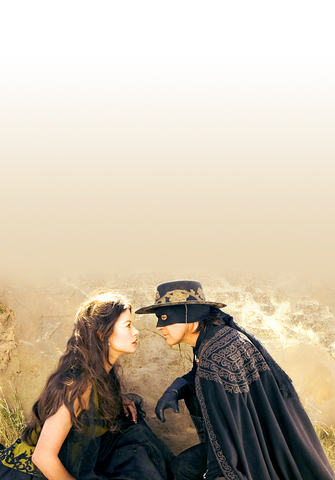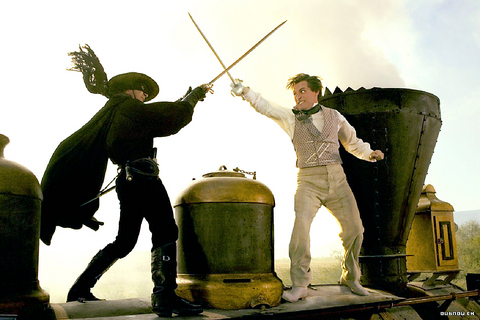Whish, whoosh, wheesh -- so says the not-so-gay blade as it slices a "Z" on the chest of an oily scoundrel. "The devil will know who sent you!" El Zorro hisses, his overheated scowl boring into the fiend before him.
Muy romanticos strings surge on the soundtrack. Zorro's sternum heaves.
Elsewhere, his wife's sternum heaves. The audience's collective sternum heaves. So it goes for 130 heave-a-licious minutes in The Legend of Zorro, a rousingly silly sequel to 1998's rousingly silly Mask of Zorro, which starred Anthony Hopkins as old Zorro, Catherine Zeta-Jones as old Zorro's daughter, Elena, and Antonio Banderas as old Zorro's young apprentice, Alejandro de la Vega.

PHOTOS COURTESY OF FOX MOVIES
That film and this one were directed by Martin Campbell, who knows not to mess too much with the genre's delicate balance of class-conscious moralizing and glam
19th-century comic swordplay. All the
elements but Hopkins remain: Banderas, Zeta-Jones, Tornado the horse, Zorro's twinkie little mask. No one ever

recognizes him; in The Legend of Zorro, even his son (impish Adrian Alonso) doesn't.
When we last left Don Alejandro back in 1840, he had hooked up with Elena and inherited both the stylin' black cape and subterranean superlair of Zorro-pere. It is now 10 years later, and Mrs. Zorro is fuming because Mr. Zorro won't retire: California, a newly minted state, no longer needs a vigilante named the Fox to
protect peasants from oppression, or so she argues. The Fox himself feels
otherwise. This age-old marital spat over home and work leads to an age-old marital breakup, and Alejandro stalks off with his trusty Tornado. After a forcible run-in with two mysterious dweebs, Elena files for divorce.
Soon after, Alejandro learns that Elena has gotten cozy with one Count Armand (Rufus Sewell, who looks dipped in paraffin). This prompts yet more marital bickering, most of it intensely annoying, and if you didn't believe some wicked fight scenes loomed on the horizon, you might soon flee, black cape flapping, into the night.
But patience is rewarded with fisticuffs and sword fights galore, a few of them clearly inspired by Douglas Fairbanks' spring-loaded
athleticism in the original, silent (and amazing: rent it) Mark of Zorro. Fairbanks required no stunt doubles. The more earthbound Banderas does, but he's still a better Zorro than Tyrone Power, who was equal parts precious and wooden, like a knickknack.
Banderas is no knickknacky Zorro. The only thing wooden about him is the scenery he bites off in every scene, a process too violent to describe as "acting." The other wooden item of his acquaintance is the set of false teeth belonging to one of his unsightlier nemeses (Nick Chinlund), who sports a cruciform facial scar and might, just might, be related to a secret Christian brotherhood that ... wait, is this The Da Vinci Code?
No -- too many loud explosions. The aural and visual overkill isn't unusual for an action flick, but swashbuckling Zorro doesn't need it. He's always been more cat burglar than munitions expert, a slinky man in black who scales walls, sneaks up on villains, engages them with a clang of steel and escapes in a thunder of hooves.
Campbell's film (and Phil Meheux's flushed, neo-Romantic photography) has moments that capture this sensuality and stealth, but it's noisier and longer than it should be. Zorro was never one to overstay his welcome. Wheesh-whoosh-whish.

Following the rollercoaster ride of 2025, next year is already shaping up to be dramatic. The ongoing constitutional crises and the nine-in-one local elections are already dominating the landscape. The constitutional crises are the ones to lose sleep over. Though much business is still being conducted, crucial items such as next year’s budget, civil servant pensions and the proposed eight-year NT$1.25 trillion (approx US$40 billion) special defense budget are still being contested. There are, however, two glimmers of hope. One is that the legally contested move by five of the eight grand justices on the Constitutional Court’s ad hoc move

Stepping off the busy through-road at Yongan Market Station, lights flashing, horns honking, I turn down a small side street and into the warm embrace of my favorite hole-in-the-wall gem, the Hoi An Banh Mi shop (越南會安麵包), red flags and yellow lanterns waving outside. “Little sister, we were wondering where you’ve been, we haven’t seen you in ages!” the owners call out with a smile. It’s been seven days. The restaurant is run by Huang Jin-chuan (黃錦泉), who is married to a local, and her little sister Eva, who helps out on weekends, having also moved to New Taipei

The Directorate-General of Budget, Accounting and Statistics (DGBAS) told legislators last week that because the Chinese Nationalist Party (KMT) and Taiwan People’s Party (TPP) are continuing to block next year’s budget from passing, the nation could lose 1.5 percent of its GDP growth next year. According to the DGBAS report, officials presented to the legislature, the 2026 budget proposal includes NT$299.2 billion in funding for new projects and funding increases for various government functions. This funding only becomes available when the legislature approves it. The DGBAS estimates that every NT$10 billion in government money not spent shaves 0.05 percent off

Dec. 29 to Jan. 4 Like the Taoist Baode Temple (保德宮) featured in last week’s column, there’s little at first glance to suggest that Taipei’s Independence Presbyterian Church in Xinbeitou (自立長老會新北投教會) has Indigenous roots. One hint is a small sign on the facade reading “Ketagalan Presbyterian Mission Association” — Ketagalan being an collective term for the Pingpu (plains Indigenous) groups who once inhabited much of northern Taiwan. Inside, a display on the back wall introduces the congregation’s founder Pan Shui-tu (潘水土), a member of the Pingpu settlement of Kipatauw, and provides information about the Ketagalan and their early involvement with Christianity. Most